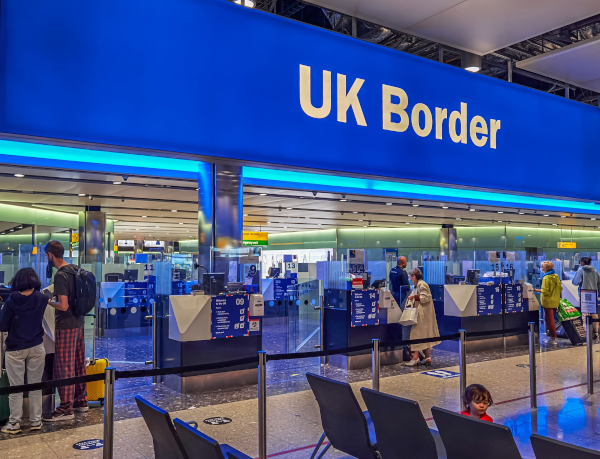Home Office publish their statement on ‘Restoring Order and Control’ within the immigration system
In this blog, we will summarise the announcements that have been made by the Home Office who have published a statement that sets out key changes they will be taking within the immigration and asylum system. One of the main reasons for the announced changes is to deter people from crossing the channel illegally on small boats, and the government have taken inspiration from Denmark who have seen the number of asylum claims reduce over recent times.
The changes announced come under the headings of:
- Reducing Arrivals
- Increasing Removals
- Safe and Legal Routes
Reducing Arrivals
The changes for those who are recognised as refugees are:
- There will be a new ‘core protection’ route which results in indefinite leave to remain only being granted after a period of 20 years, rather than the current period of 5 years;
- Leave to remain will be granted for periods of 2 ½ years at a time, and each time leave is being renewed a review will be done to work out if the person still requires protection. If they do not still require protection, they will become liable to be removed;
- There will be a new protection ‘work and study’ route that allows someone to qualify for indefinite leave to remain sooner. A fee will need to be paid to switch into the work and study route;
- There will be no automatic right to family reunion. If a person enters the ‘work and study’ route then they may become eligible to sponsor family members;
- A consultation will take place in 2026 to review how migrants are able to access taxpayer-funded benefits.
The changes for those who receive asylum support whilst awaiting a decision on their asylum claims are:
- A change to the law will be made so it is no longer a legal obligation to support asylum seekers who would otherwise be destitute. Decisions to support will become discretionary;
- Support will not be provided to those who have the right to work and can support themselves;
- Support will be denied to show who intentionally make themselves destitute;
- Criminality will form a basis on which to stop supporting someone;
- If someone has assets or income, they will be required to contribute towards the cost of their asylum support. Reference in the media has been made to the way that Denmark has implemented a similar approach to seize jewellery from asylum seekers;
- Provision of hotel accommodation will stop by the end of this parliament.
The changes to tackle illegal working are:
- The company will change the law to make it easier to crack down on illegal working within the gig economy;
- The government will introduce digital ID with the aim of making it more difficult for people to use fraudulent documents to gain employment.
Increasing Removals
In order to make it easier for the government to remove those who have not made a successful asylum claim:
- They will continue to try to remove people under the one in one out agreement with France;
- They will look to start enforced removals to countries where there has been regime change;
- There will be a tougher approach taken to enforce the removal of families;
- They will look at exploring the use of ‘return hubs’ in safe third countries
In order to make it easier to return people to certain countries, the government will:
- Work to reach agreements with other countries that allows for the swift return of those without a right to be in the UK. This is aimed at addressing the time it can take to obtain a travel document to allow removal of a person to a particular country;
- Impose ‘visa penalties’ on countries that do not co-operate with the return of their citizens. This could mean that visa applications are not accepted for individuals from particular countries until the country of their nationality starts co-operating with enabling the return of individuals.
The government will reform the appeal process:
- There will be a greater amount of capacity created within the current Tribunal system;
- A new appeals body will be created, staffed by professionally trained adjudicators. Early legal advice will be part of the system. It is unclear whether decisions by this new appeals body could be appealed;
- Certain types of cases will be accelerated – such as cases involving individuals that are considered to pose a risk of high-harm;
- There will be emphasis on all issues being raised within a single appeal. Applications made after an unsuccessful appeal are very unlikely to be successful;
- If someone wants to make a fresh asylum claim after having had one considered, they will need to demonstrate why the matter is being raised late and that it is substantially different from the initial claim. Where fresh applications are made, fees will need to be paid.
The government will change the law as follows:
- The right to respect for family and private life is protected as a human right under Article 8 of the European Convention on Human Rights. The government will introduce measure to ensure the public interest in removal is ‘properly balanced’ with Article 8 ECHR rights;
- Family will be defined to ensure that it is only close family members whose rights are protected;
- If someone is making an article 8 claim from abroad, then it will be the UK-based sponsor that makes the application;
- The government are working with other international parties to look at re-defining the right not to be subjected to inhuman and degrading treatment under Article 3 of the ECHR, so that it is more narrowly interpreted, potentially impacting those who have omitted serious offences or those who are blocking removal due to their healthcare needs;
- The approach to modern slavery and trafficking claims will be reformed to encourage earlier disclosure of potential claims and to tackle improper claims
In order to address other barriers to removal, the government will:
- Change the immigration rules to so that the ‘most egregious’ protection claims can be considered and refused following a single interview
- Increase the ability to deport foreign national offenders prior to their prosecution occurring;
- Utilise ‘facial age estimation’ technology based on AI advances to carry out age assessments
Safe and Legal Routes
The government will introduce the following measures with respect to ‘safe and legal’ routes for people to obtain protection in the UK:
- A framework based on refugee sponsorship by voluntary and community sector organisations which will include an ‘annual cap’ on the number of arrivals arriving through safe and legal routes
- Create a capped route for skilled refugees and displaced people to come to the UK to work. This will be a 10 year route to settlement.
Restoring Order and Control in UK Immigration Statement Conclusion
As with any changes to the immigration system, it will only be when the detail of the changes is released that the impact can be more clearly worked out. Some of the changes will likely be pushed through more quickly than others.
We will continue to provide blog updates as more details are known. If you would benefit from a consultation with one of our experienced and exceptional lawyers, you can book this through our website here.

Contact Us
Not quite ready to book an appointment yet or unsure if it’s the right step for you? No worries! We understand that making decisions regarding legal matters can be daunting.
Reach out to our Client Care Manager, Rikki, who will be more than happy to assist you and guide you in the right direction.
Your peace of mind matters to us, and we’re here to support you every step of the way. Contact Rikki today for personalised guidance and assistance.

